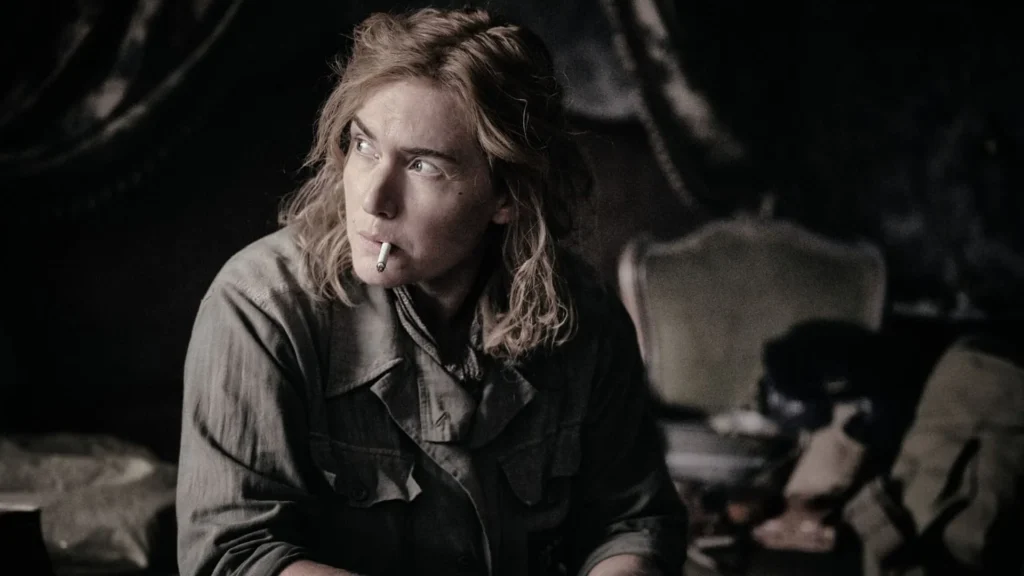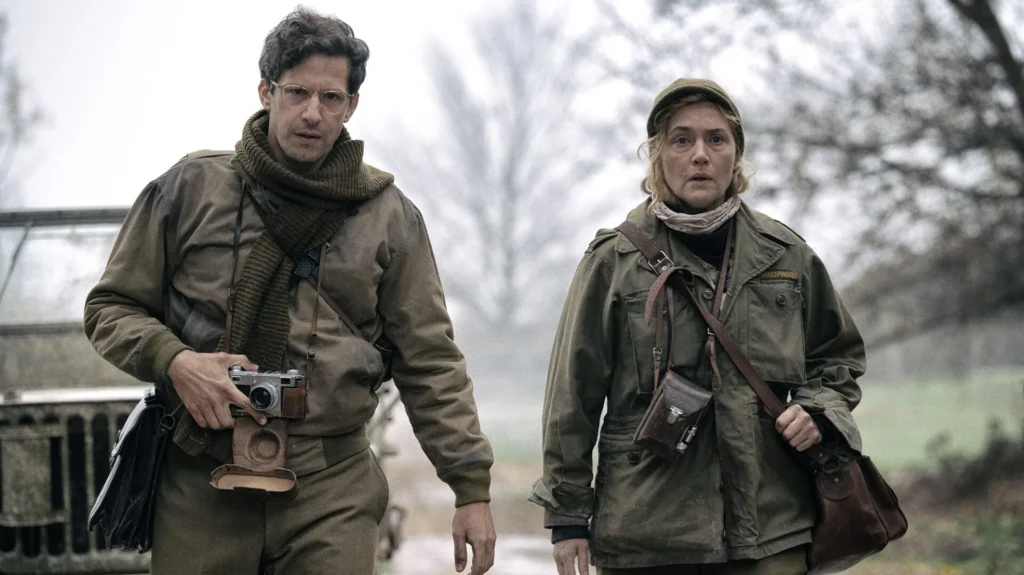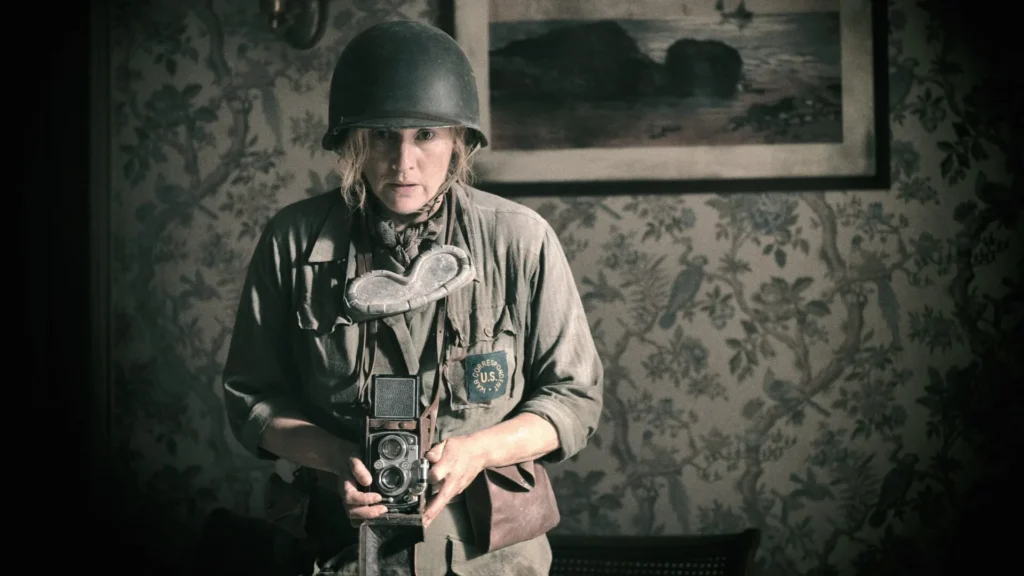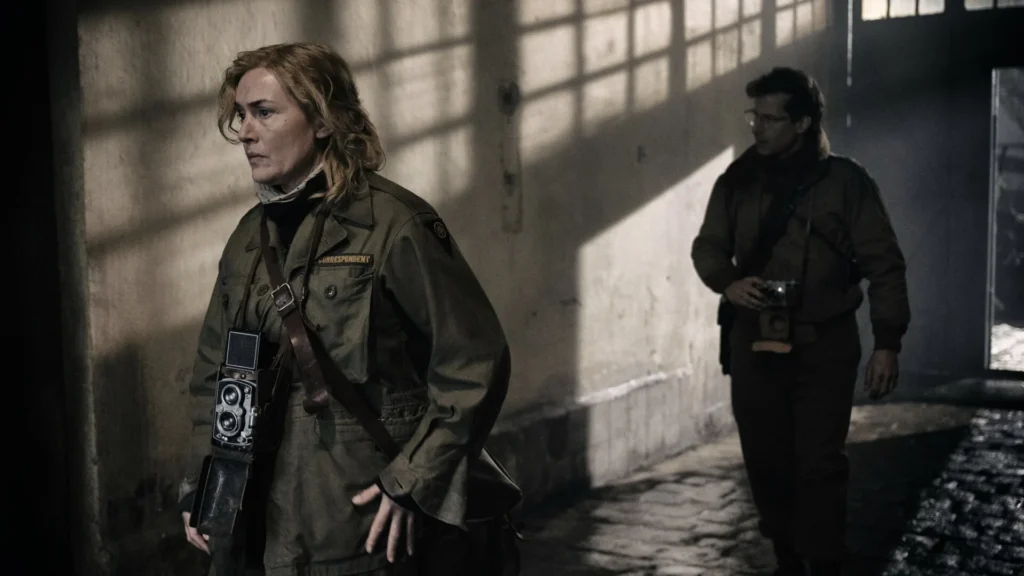
"Lee," directed by Ellen Kuras and featuring a stellar performance by Kate Winslet, brings to life the remarkable story of war photographer Lee Miller. The film serves as a poignant exploration of Miller's journey, highlighting her resilience and groundbreaking contributions during World War II. Critics have lauded the film for its compelling narrative and Winslet's transformative portrayal, while audiences have resonated with its emotional depth and historical significance.
The narrative structure of "Lee" is both engaging and thoughtful, framed through an interview between Miller and a young journalist, portrayed by Josh O’Connor. This retrospective approach effectively unpacks Miller's life, allowing viewers to delve into her personal and professional struggles. The film opens with a vivid depiction of Miller amidst the chaos of battle, capturing the intense realities of war through dynamic cinematography. This initial portrayal sets a gripping tone, immersing the audience in the harrowing environments Miller navigates as a photographer.
One of the standout elements of "Lee" is its thematic focus on courage and defiance. The film emphasizes Miller's role in documenting critical events, such as the first photographic evidence of the Holocaust, underscoring the importance of her work in revealing the brutal truths of conflict. Pawel Edelman, the cinematographer, employs a muted color palette for war scenes, creating a stark contrast with the earlier, more vibrant sequences. This visual strategy enhances the emotional impact, highlighting the stark differences between Miller's personal life and the external turmoil she captures through her lens.
Kate Winslet's performance as Lee Miller has been a focal point of praise. Critics argue that Winslet delivers a nuanced and powerful portrayal, embodying Miller's complex personality with remarkable authenticity. Her ability to convey Miller's grit, determination, and vulnerability has been widely acclaimed, with many noting that Winslet fully immerses herself in the role. Viewers have echoed these sentiments, often highlighting Winslet's ability to bring depth and empathy to the character, making Miller's experiences both relatable and inspiring.
Supporting performances also contribute significantly to the film's overall impact. Andy Samberg as David Scherman adds a layer of emotional complexity, portraying Miller's tumultuous relationship with a fellow photographer with sensitivity and depth. Josh O’Connor's role as the young journalist provides a compelling counterpoint, offering a contemporary perspective that bridges Miller's past with the present. These performances, combined with strong character development, create a rich and immersive narrative that keeps audiences engaged throughout.
Ellen Kuras, in her feature directorial debut, demonstrates a remarkable command of visual storytelling. Her direction ensures that the film remains faithful to Miller's legacy while also exploring her personal struggles and triumphs. Kuras's ability to balance historical accuracy with emotional resonance has been praised by both critics and viewers. The director's attention to detail, from the accurate portrayal of wartime settings to the nuanced character interactions, creates an authentic and immersive experience.
The musical score by Alexandre Desplat plays a crucial role in setting the film's tone. Desplat's composition complements the narrative, building tension and enhancing the emotional gravity of key scenes. The score seamlessly integrates with the film's pacing, heightening moments of suspense and sorrow without overwhelming the story. This collaboration between director and composer results in a cohesive and emotionally compelling soundtrack that elevates the overall cinematic experience.
While "Lee" has been widely praised, it has not been without its critiques. Some reviewers have noted that the film occasionally drags, particularly in sections where the pacing slows to focus on character development. Additionally, a few critics feel that the film misses opportunities to delve deeper into certain aspects of Miller's life and the broader historical context of her work. Despite these minor criticisms, the overarching consensus remains positive, with many acknowledging that "Lee" successfully captures the essence of a pioneering woman who made significant contributions to both photography and journalism.





Audience reactions have mirrored the critical acclaim, with many viewers expressing admiration for Winslet's dedication and the film's heartfelt portrayal of Miller's story. Social media platforms and review aggregators like Rotten Tomatoes and IMDb reflect a predominantly positive reception, with praise often directed at the film's emotional resonance and historical authenticity. Fans appreciate the film's ability to shed light on a lesser-known yet influential figure, bringing Miller's legacy to a broader audience.
The film also sparks discussions about the role of women in war and journalism, emphasizing the challenges Miller faced in a male-dominated field. This thematic exploration has been highlighted by both critics and viewers as a significant strength of the film, providing a relevant commentary on gender dynamics that resonates beyond the historical setting. By focusing on Miller's perseverance and impact, "Lee" contributes to ongoing conversations about representation and recognition in both media and history.
In summary, "Lee" (2024) stands out as a meticulously crafted biographical drama that honors the life and work of Lee Miller. With exceptional performances, particularly by Kate Winslet, and thoughtful direction by Ellen Kuras, the film offers a moving tribute to a trailblazing woman who captured some of history's most harrowing moments. While it may have minor pacing issues, the film's emotional depth, historical significance, and visual storytelling make it a compelling watch for those interested in powerful biopics and the enduring legacy of influential figures like Lee Miller.
Frequently Asked Questions about "Lee" (2024)
What is the movie "Lee" about?
the film is a biographical drama directed by Ellen Kuras. It explores the life of renowned war photographer Lee Miller, highlighting her significant contributions during World War II and her struggle against societal norms.
Who stars in "Lee"?
The film features a standout performance by Kate Winslet as Lee Miller. Supporting roles include Josh O’Connor as the young journalist and Andy Samberg portraying David Scherman, Miller's fellow photographer.
Who directed "Lee" and what is notable about their direction?
the film directed by Ellen Kuras, known for her expertise in photography and filmmaking. This film marks her feature directorial debut, showcasing her ability to blend historical accuracy with emotional storytelling through meticulous visual storytelling and attention to detail.
What is the narrative structure of "Lee"?
The story is framed through an interview between Lee Miller and a young journalist, portrayed by Josh O’Connor. This retrospective approach allows the film to delve into Miller's personal and professional life, providing a comprehensive view of her experiences during and after the war.
How does the cinematography enhance the film?
Cinematographer Pawel Edelman employs a muted color palette for war scenes, creating a stark contrast with the more vibrant personal sequences. This technique enhances the emotional depth of the film, effectively highlighting the harsh realities of war against Miller's personal struggles and triumphs.
How is Kate Winslet's performance received?
Kate Winslet delivers a transformative performance, embodying Lee Miller's complex personality with remarkable authenticity. Critics and audiences alike have praised Winslet for her ability to convey Miller's grit, determination, and vulnerability, making the character both relatable and inspiring.
Who composed the music for it and how does it impact the film?
The musical score is composed by Alexandre Desplat. His compositions complement the film’s tone, building tension and enhancing the emotional gravity of key scenes. The soundtrack seamlessly integrates with the film's pacing, heightening moments of suspense and sorrow without overshadowing the narrative.
What themes are explored in "Lee"?
the film delves into themes of courage, resilience, and defiance. It emphasizes Miller's role in documenting pivotal historical events, such as the first photographic evidence of the Holocaust, and her struggle against misogyny in a male-dominated field. These themes highlight Miller's perseverance and the importance of her work in revealing the brutal truths of war.
How has "Lee" been received by critics?
Critics have lauded "Lee" for its compelling storytelling and Kate Winslet's gripping performance. The film is praised for its emotional resonance and historical authenticity. However, some critics mention that the film occasionally drags, particularly during slower-paced character development scenes, and suggest that it misses opportunities to fully explore certain aspects of Miller's life.
What do audiences think of "Lee"?
Audiences have responded positively to "Lee," appreciating Winslet's dedication and the film’s heartfelt portrayal of Lee Miller’s story. Reviews on platforms like Rotten Tomatoes and IMDb reflect a predominantly positive reception, with many viewers highlighting the film’s emotional depth and historical significance.
Where can I watch "Lee"?
You can watch "Lee" online through streaming platforms. The movie is available for streaming, allowing viewers to experience Lee Miller's remarkable story from the comfort of their homes.
Is "Lee" historically accurate?
Yes, the film maintains a high level of historical accuracy. Director Ellen Kuras ensures that the portrayal of wartime settings and Miller's experiences are authentic. The film meticulously recreates the environments Miller worked in, providing an immersive and faithful representation of the historical events depicted.
Does "Lee" cover Lee Miller's personal life?
Absolutely. In addition to her professional achievements, the film explores Miller's personal struggles and relationships, particularly her tumultuous relationship with fellow photographer David Scherman, played by Andy Samberg. This dual focus offers a well-rounded view of Miller as both a trailblazer in her field and a complex individual.
What sets "Lee" apart from other biographical films?
"Lee" stands out due to Kate Winslet's exceptional performance and Ellen Kuras's visually striking direction. The film balances detailed historical accuracy with emotional storytelling, providing a nuanced portrayal of Lee Miller's life. Additionally, the film's focus on a pioneering woman in a male-dominated field adds depth and relevance to contemporary discussions about gender dynamics.
How does "Lee" handle the depiction of World War II?
The film captures the intense realities of World War II through dynamic cinematography and a gripping narrative. It effectively portrays the chaos and brutality of war, particularly through Miller's lens as a photographer documenting significant events like the Holocaust. This realistic depiction underscores the importance of Miller's work and the profound impact of her photographic evidence.
What discussions has "Lee" sparked among viewers and critics?
"Lee" has sparked conversations about the role of women in war and journalism, highlighting the challenges faced by Lee Miller in a male-dominated profession. The film's exploration of gender dynamics and the recognition of women's contributions to history have been lauded as significant strengths, resonating with ongoing conversations about representation and equality in media and historical narratives.
Are there any notable supporting performances in "Lee"?
Yes, the supporting cast, including Andy Samberg and Josh O’Connor, deliver compelling performances that add depth to the film. Andy Samberg’s portrayal of David Scherman provides emotional complexity, while Josh O’Connor’s role as the young journalist offers a contemporary perspective that bridges Miller’s past with the present, enriching the overall narrative.
Who are the key contributors behind the scenes of "Lee"?
In addition to director Ellen Kuras and composer Alexandre Desplat, Pawel Edelman serves as the cinematographer, bringing a visually compelling style to the film. The collaborative efforts of the talented crew ensure that "Lee" is both a visually stunning and emotionally engaging film.
What impact does "Lee" aim to have on its audience?
"Lee" aims to honor the legacy of Lee Miller by bringing her story to a broader audience. It seeks to inspire viewers through Miller's courage and resilience, emphasizing the importance of documenting truth and challenging societal norms. The film also aims to educate audiences about Miller’s significant contributions to history and photography.
Has "Lee" received any awards or nominations?
As "Lee" is a 2024 release, specific details about awards and nominations may not yet be available. However, given the strong performances and critical acclaim, it is anticipated that the film could receive recognition in various film circles and award platforms.
https://review.mustwatch.cc/reviews/movie-review-lee-movie-review-2024/?feed_id=1638&_unique_id=66ffa1e14a136


Post a Comment